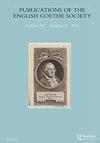Neology vs.激进启蒙:Gotthilf Samuel Steinbart、Jakob Mauvillon和Frederick关于自爱作为道德原则的伟大文章(1770)
IF 0.1
3区 文学
0 LITERATURE, GERMAN, DUTCH, SCANDINAVIAN
引用次数: 0
摘要
本文讨论了德国神学家施泰因巴特(1738-1809)的一部作品的盗版翻译,并指出该作品的作者是德国激进启蒙运动后期的重要人物雅各布·莫维隆(1743-1794)。在这本《动机的检验》(Examen des motifs本文章由计算机程序翻译,如有差异,请以英文原文为准。
Neology vs. Radical Enlightenment: Gotthilf Samuel Steinbart, Jakob Mauvillon, and Frederick the Great’s Essai sur l’Amour-propre envisagé comme Principe de Morale (1770)
ABSTRACT This article discusses a pirated translation and edition of a work by the German theologian Gotthilf Samuel Steinbart (1738–1809) and shows that it can be attributed to Jakob Mauvillon (1743–1794), an important figure of the late Radical Enlightenment in Germany. In this Examen des motifs à la vertu (1774) Mauvillon submerges the primary text in a flood of commentary, with the aim of discrediting Steinbart’s claims. Steinbart’s work was itself a response to a treatise by Frederick II of Prussia (1712–1786). Mauvillon’s intervention was intended to warn against the alliance between church and state that he saw emerging in Frederick’s treatise and Steinbart’s response
求助全文
通过发布文献求助,成功后即可免费获取论文全文。
去求助
来源期刊

Publications of the English Goethe Society
LITERATURE, GERMAN, DUTCH, SCANDINAVIAN-
CiteScore
0.10
自引率
0.00%
发文量
15
 求助内容:
求助内容: 应助结果提醒方式:
应助结果提醒方式:


